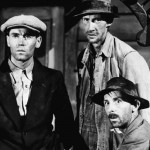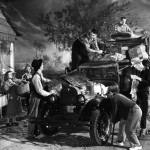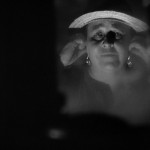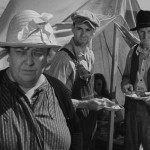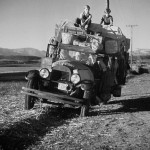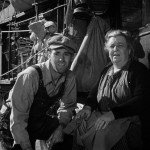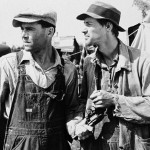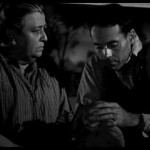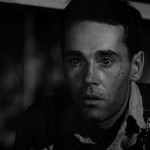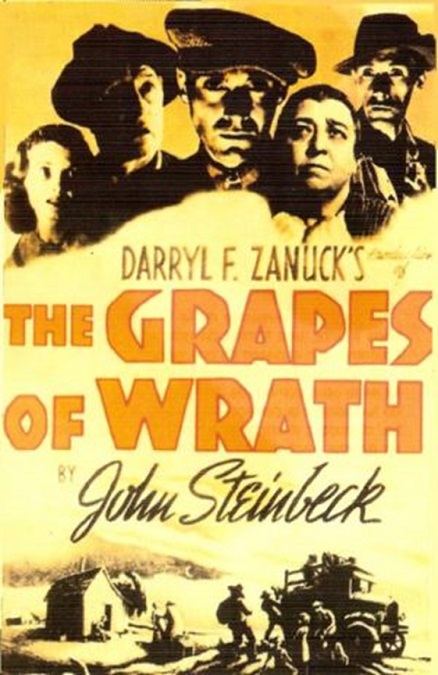
The Grapes of Wrath – 1940
This is one of those films which I expected to be good and I was not disappointed. It was historically accurate, though it was fiction. It was serious and dramatic with moments of tenderness and deep emotion. The acting was very good and the story was engaging. It takes place during the era of The Great Depression and is almost like a snapshot of the terrible period of American history. And it was made at a time when movies were generally fantasies about rich and beautiful people. Director John Ford took us in the opposite direction.
It starred Henry Fonda as Tom Joad, a man who has just gotten out of prison. He returns to his Oklahoma farming family only to discover the house in which he grew up to be deserted. He runs into Jim Casey played by John Caradine, an ex-preacher who is now a homeless vagabond. Together they find Tom’s family staying at an uncle’s home. They are about to pack up everything they own and move to California where there was supposed to be work.
Here we meet his extended family of twelve. Most notable are his mother and father, Ma and Pa Joad, played by Jane Darwell and Russell Simpson. They all did well and really seemed like authentic people of that time period. Fonda himself did a great job. He had an intensity about him that was subtle and yet effective. There was a keenness in his eyes and a passionate edge to his acting. His character was a difficult one to figure out completely. On the surface, Tom Jaod just wanted to be left alone to take care of his family. But underneath, and not very far underneath, there was a man who was not opposed to violence to defend what is right or attack what is wrong.
But it was his mother that was the real powerhouse. Jane Darwell’s portrayal of Ma Joad earned her the Academy Award for Best Supporting Actress that year, and I think she really deserved it. Ma Joad was the glue that held the family together. She was strong and determined to keep everyone going. She took everything the world had to give, all the hardships, the pain, the sacrifices, and all the grief, and she never let it beat her. She did what she had to do to make sure that the family survived.
The first time I really saw her skills as an actress shine was in a simple and yet startlingly touching scene when the Joad family is preparing to leave their farm. She is taking old mementos, photographs, and postcards that spoke of happier times and burning them. It was like she was letting go of the past in order to prepare herself for an uncertain future. At one point she finds a pair of fancy earrings that you would never see on a poor farmer’s wife. Obviously, she had worn them in her youth, a time when there was plenty of work, plenty of food, plenty of gaiety and laughter. She holds them up to her ears and looks into a mirror, remembering, but you could just see the heartbreaking sadness in her eyes.
Along the way to California, both Grandma and Grandpa Joad die and the children often go without food. Not only was the nation facing financial difficulties and hellish dry weather that prevented crops from growing, but it also faced incredible social injustices. Rich people ate well and cared nothing for the poor and starving people. They were treated like animals and forced to live on scraps.
And when people like Jim Casey tried to speak out against the social injustice, those in authority went out of their way to silence him… permanently. Tom sees Jim murdered and retaliates by murdering someone himself. He escapes unseen and returns to his family. But eventually the law catches up with him, so he does the only thing he can do. He leaves.
The scene in which he says his last goodbye to his mother was particularly well-acted. But it was Ma Joad’s little speech at the end that really caught my attention and bears repeating here. She said, “I ain’t never gonna be scared no more. I was, though. For a while it looked as though we was beat. Good and beat. Looked like we didn’t have nobody in the whole wide world but enemies. Like nobody was friendly no more. Made me feel kinda bad and scared too, like we was lost and nobody cared…. Rich fellas come up and they die, and their kids ain’t no good and they die out, but we keep a-coming. We’re the people that live. They can’t wipe us out, they can’t lick us. We’ll go on forever, Pa, cos we’re the people.”
